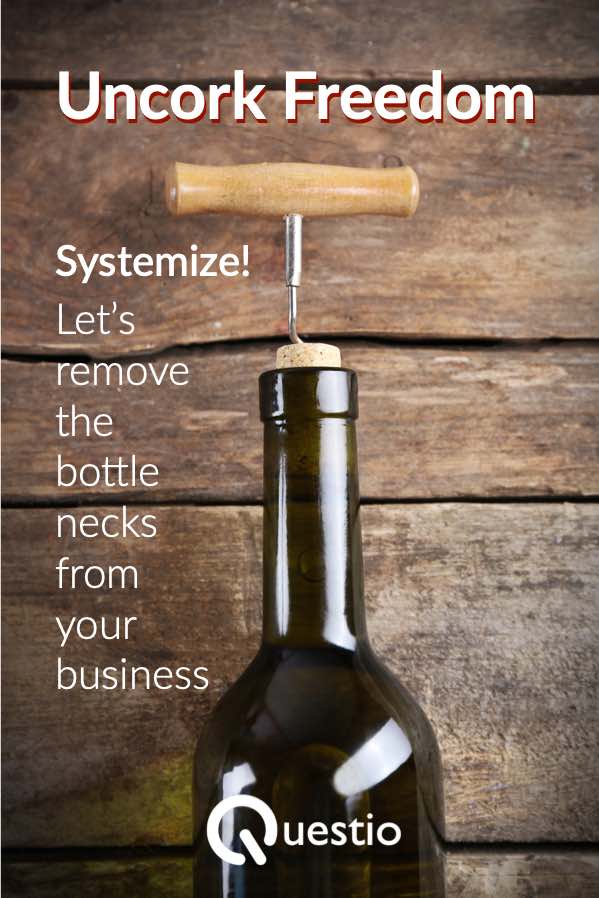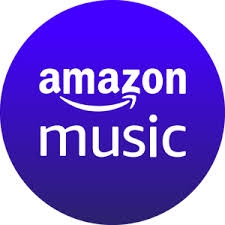Root to Grow
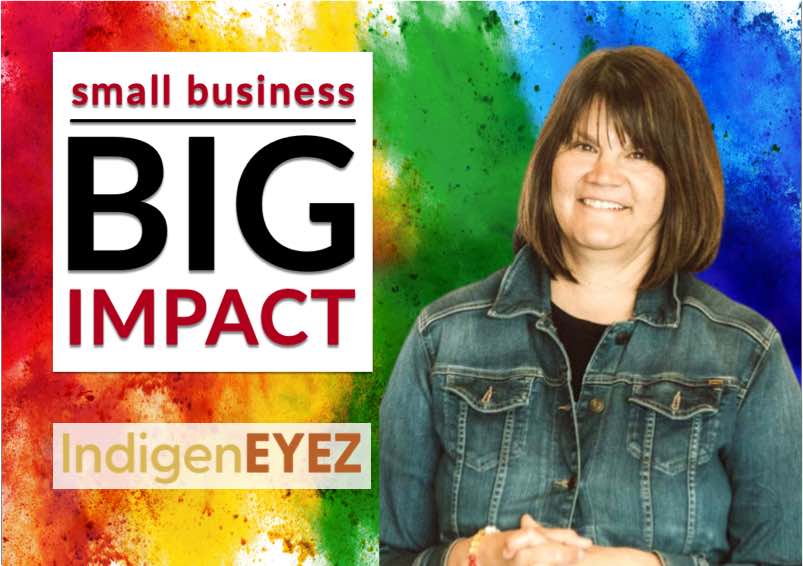
IndigenEYEZ, led by Kelly Terbasket, is drawing on her syilx heritage to engage in a spiral of transformation by rebuilding relationships between indigenous communities through arts-based facilitation (as established by Partners for Youth Empowerment, PYE Global). She experienced big leaps in her journey as a result of participating in Social Venture Institute events and later getting support from Purppl.
Show Notes
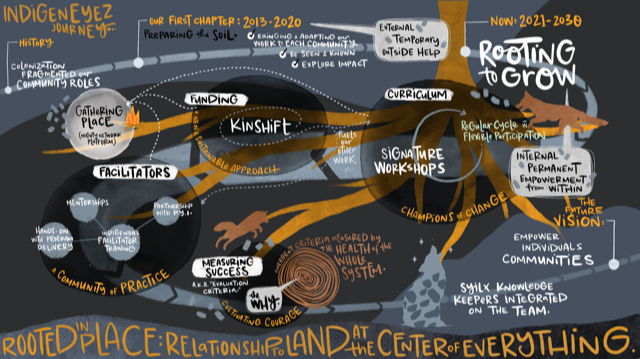
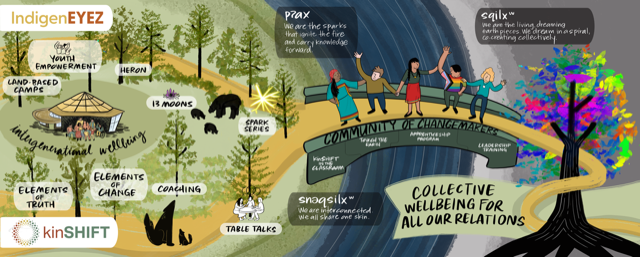
Transcript
Jalen
So welcome, Kelly. I am really excited to be chatting with you this morning. It's nice and early. It's nice and quiet here. I'm interested in talking to you about the story that you mentioned earlier about rooting to thrive... actually... rooting to grow... steps you've taken on your journey with IndigenEYEZ.
Kelly
Yeah, thank you. Thanks Jalen for having me. I like that... root to thrive as well. We you know, as I was mentioning, we hit a place in our journey after. There about 10 years, it's been almost 10 years that we've been running and just in a place where I realized that for our program to be sustainable long term. That I needed to change what I was doing drastically. So what I was doing... was not sustainable, so it was a very clear line where we decided to. Our whole strategic directions and what that meant for us was that we stopped going in a million directions. Basically, you know, a lot of our beginnings were calls to action, so we would be asked from communities to come and deliver. Program, we tailor it every time just about. I mean they were sometimes.
Jalen
Wow, custom every time.
Kelly
Every time we are custom designing tweaking, you know like they were similar, but they needed to be custom design. And lots of travel. You know we have a small network of facilitators trying to juggle that I I often joked and said I was like Jerry. Maguire I was just. Basically, being a Jerry Maguire for a bunch of facilitators who had their own career going, we were spreading the word for indigenize. We were showing what these methodologies could do in a diverse variety of contexts, but we weren't growing one like we weren't growing our signature works. So the drastic, like lying in the sand, I say, and turning this around has been to stop doing that and we've started building our signature workshops in the last few years and offering them online. Has changed everything for us. We can reach more people and therefore fill the seats. It's hard to fill the seats in one geographical area for some of our programs.
Jalen
Was there an event that helped you draw the line in the sand?
Kelly
Yeah, a great question. Thank you I I would say it was more of a personal event as the leader as the you know director of IdigenEYEZ. And my age and I, I was thinking, you know? I want to. Leave I really, I believe so strongly that what we have to offer is medicine for relationships. And you know when I first discovered creative community building methodologies from Pye Global. I knew in that first workshop that I I told Charlie Murphy the co-founder. I said you had me buy the first copy. Right? Because I. Knew I knew that this space that you can create with these methodologies. Is what is needed to rebuild our communities, our relationships, the impact colonization has, you know, done a lot of damage on our relationships with each other and it makes it really hard to. Move forward to our goals when we're not in unity like we have known how to be since time of Memorial. Those things, those patterns, those relational patterns, and ways of being and knowing have been deeply disrupted, and so these methodologies I could see they can rebuild our relationships. And so I like, have this deep desire to to to scale to, to share. I see myself as someone who is a witness to over. I've visited over 100 communities, indigenous communities in BC. I saw common challenges which were relational, you know, divides. Having challenges and you know, without being able to have those courageous conversations and. And uphold our values of kindness and care and reciprocity and all those important values that that build sustainable relationships. Without that, you know you have high staff turnover, you have. You know you have people moving in different directions and you can't. You can't move towards your goal, so so it just it felt like I have this like this gold this oh this medicine. And how do I bring it to those communities that I? Have witness. And so I was feeling like frustrated. I guess I hit this point of. You know it's it's something to to know you have something to offer but you can't get it to the people that need it. So I was like you know how I I only want to work for another 10 or 15 years. You know, like I'm how am I going to make sure that this program isn't just going to fizzle out? And it's not just me that has seen the value of this program. It's also many people have come and experienced our training, our leadership trainings and camps, and they're like yes, they see that. But how do we translate that so that people are using that in their own communities and own?
Jalen
So you had this you, you know you had this clarity around the vision and you have been putting tons of effort into trying to bring it to the people. And then you reached a point where you realize, like hold on the way I'm doing, this just isn't going to deliver. It's just not going to. It's not sustain.
Kelly
I call them one offs so like 1 offs, meaning you know if it's a one day workshop or even a even like a A5 day workshop that might inspire people it you know creates some transformation, but that doesn't create deep systemic change, it doesn't create. Relational shifts, you need enough people that are willing to to make the changes to use the methodologies and not takes a longer term path. Pathways so so routing to grow includes pathways for transformation. We call it the spiral of transformation that's based on our chopped teak in our seal culture. Our teachings talk about the spiral versus a linear pathway. But so in that pathway we want to create ongoing options for communities to stay in the learning journey and stay connected with each other. And we're going to include research I've started. Building relationships with university. On creating a research component to what we? Do so at the core of the essence of rooting to grow has to do with you. Know creating a community of practice and also making sure we have you know measurable outcomes and stuff.
Jalen
And so the this this pivot. So basically you know this issue around recognize your vision and then realizing it couldn't? It couldn't happen. So what was the process you went through to that took you in the direction that you feel like will deliver the potential?
Kelly
Well, the I think one of the biggest things is I realize like I need sustainable funding, right? So since we started I've been mostly, you know, surviving on philanthropy on foundational funding, and it's sporadic so. So like a lot of times, foundations will fund you. And I was fortunate near the beginning to get a three-year funding, but then they couldn't continue that. So you know, and then proposal driven not can throw you off course, right? Chasing the money through proposals and as any other nonprofit knows, you end up spending so much time writing proposals and I think. You might get about 40% success. I don't know the exact percentage, but you definitely don't get all the proposal all that time.
Kelly
You put into writing proposals and then you have to also meet their mandates, which might not be in total alignment with your vision and your mission, you know. Right?
So so where things changed for me drastically was when I discovered social enterprise. You know, when I first went to SCVI years ago and and you know, discovered this world of. You know social change makers and enterprise. Because I I didn't even know that this sector existed because I had been working solely on reserve and indigenous communities. And you know, in my bubble, and I was so inspired that there's people out there who are wanting to have an impact on our social change. And make a living out of that. That you can go outside the box that you can create. You can create your own pathways outside of government funding out outside of like the very limited programs and and services available. So that was where I was first excited and and received a lot of amazing coaching and advice at that event. It was. Really like impactful for me. And that was in my beginning years. I remember that helped a lot for diversifying like OK. The key thing that I've learned there I remember was like don't put all your eggs in one basket. You got to diversify. So I remember like. OK, so I'm going to make sure to both. You know, explore foundational funding and government funding and and think about how do I have a business lens towards what I'm doing as well? So as you know, as such a small organization I I couldn't really put energy into that, even though I like that idea of like a threefold approach to our funding model. So years and years go by so Fast forward and. A good friend of mine told me about this organization called Purple. It's a social enterprise accelerator coaching program. This is where things really change for me as I receive coaching for a couple of years. I I liked it so much as this I need to have someone who has that business model or social enterprise lens to help me transform the way I do things. And that's where kinship was born and we were doing like TRC. Kind of, you know anti indigenous. Racism workshops and cultural safety workshops here and there sporadic. But what I you know what my coaches were encouraging me to consider doing it as a signature program and making money from it. They're like this is a win win. People want to contribute to truth reconciliation and want to contribute, but they don't know how you're giving them a how you're saying. Come take our training and not money. So here's my main point, Sir. Money that I started making from Ken Shaft was enough security for me and my operational. My annual operational budget that I I was like, OK, I can actually hire another full time person. Before this, I've been working with part time everything one day a week. Part time. You know, some people work two days a week. Everyone's like part time, and I've never actually posted a job before. I've always been like you know, you meet someone and they're doing this work so you're like, can you do give me a one or two days? Never felt secure enough in my annual budget. To hire actually post and provide people with proper benefits and stuff that help me do that. And and having Katie like. Operations Coordinator is has changed everything for us to be able to move towards the strategic directions that we want to go to the routing to grow.
Jalen
OK yeah, that makes a lot of sense. It sounds like through the coaching that you received with purple and a lot of things were brought into focus and you're able to see a pattern. That was a way forward and it's been working.
Kelly
Yes it is. I don't know if you want me to share some of the things that shifted. I just
Jalen
Yeah, absolutely. Like what is. What is the impact that is what has happened as a result.
Kelly
Well-being is, you know, coming from a background of, you know, I've always worked in a job before like that was funded in a in a government funded job or when I was a consultant and ran my own consulting business. It was I. I never really thought about. Making a lot of money because. I work, I work in indigenous communities and you know often the budgets are. I know because I've worked for my own band. I know that our the budgets aren't big, so I never like. I always kept my rates very low. You know, just enough to cover my cost and make make a bit of a living. So when I started working with purple and we were building up the. You know, rates that we're going to charge and everything, and how many workshops a year do we do? And all. I started realizing that I had been under charging indigenized for all these. Years I never charged people for the development fee like remember I was saying I custom designed every time never charged for that. At all days.
Days just got charged the facilitation rate and so like things like that, right? Like this happens all the time for facilitators. How are we supposed to know this? We're just. Flying by to see our paths when we start as facilitators and we don't know how much to charge, we don't know how to like. There's just such a steep learning curve, so. So they really helped by showing other models what other facilitators, other consulting businesses are charging really broke it down. They got me to identify all the time that went into doing one training and I was shocked. I was shocked. Yeah, yeah so. So and they also the most exciting part for me was how I realized that the work of Ken shift and you know, providing workshops for settlers that not only do they get to learn and you know our hope is that they leave inspired and. You know, feeling mobilized to want to learn more? To be on the journey, but also they got to help fund our programs for indigenize. So the revenue that we make from kin shift. Has allowed me also to expand like we're starting up a couple new programs. We started up an apprenticeship program so we're supporting indigenous facilitators to learn how to facilitate and giving them mentorship. Up we started up we're starting up. It's going to be starting up in January, a program for Indigenous people who want to learn the impacts of colonization or understand. We have a lived understanding of it, but like to be able to understand and articulate some of the. The ways that it impacts our communities and ourselves, and especially those who work with settlers in their workplace. How do you? How do? You deal with racism. How do you take care of yourself in those systems? Because a lot of people can't leave their jobs even though they're encountering racism. And you know, microaggressions that day they need to stay in their job. So how do we support them to call out or call in and and keep themselves well? Through that we have a lot of new programs that we've been able to build because of this.
Jalen
Well, it sounds like it's it's changed everything and how has it changed.
Kelly
Well, I definitely feel you know, like remember I said I had that feeling. Of like all this work. And and and it's just like spread out and it doesn't. You know, like what is the impact? So how has it changed me as I feel like? This this vision, this dream that I've had and this work that I've been doing. Is going to actually be passed on like it's going to be sustainable? My vision is going to be actualized.
Speaker
Be excited.
Jalen
Oh, no kidding, hey. So if you were able to go back and whisper something into your ear, what would you? What would that message be?
Kelly
I love that question. Well, I would. I would just say that you know I would want to tell my my younger Kelly that was just starting the journey to that, that less is more I guess. And that you know the the value of like focusing in and and being clear on what you want to offer. Long term. I think you know and I'll honest. Like what I was trying to prove, like when you know that something when you have this belief that something works really well and that you see something really big you want everyone else to see it as like you're trying to prove yourself. So I guess I would tell. I would say whisper in my ear. You don't need to prove yourself believe in your vision and just root to grow. I wish I started rooting to grow. Back then?
Jalen
All it takes. For us to learn these. Small but powerful lessons, right? You've mentioned how having a social enterprise aspect formed within kinship has given you the ability to then deliver on everything else that indigenize stands for. Do you see it moving beyond that or do you feel like that that that you feel like that's that the full vision is now in focus and it's a matter of executing?
Kelly
Oh, I've. I just see so much potential for it to grow like I'm going to give you an example. We have a program called 13 moons in it's working with indigenous women plus and it's like a full year program and it's wonderfully like multi generational. We have all ages in there and. Is creating natural mentorship and? I've been able, you know, we get to see someone when they first come in and they grow and their confidence and their expression. And it's just so like to me the ripple is when those women are going into their communities and their leadership roles and the people around them are seeing. Wow, what's happening with? This look at her just shine and come out of her. Well and then like that brings people back into the journey like it's just like this, you're pulling out into the community and the circle of so I really see the potential for these programs to ripple outwards. And that I'm a storyteller. So I hope it's OK if I tell a quick story. It's about 25 years ago I was doing a job with Health Canada where I flew all over and see and one of the communities I went into was really like a really devastating in a very like it it was so overwhelming seeing their live reality. And I I was there to help them like deliver or set up a program and help consult with them on like how to make that program successful. And I realized that that program was just a Band-Aid, another of many band aids that government funds. And I left there just feeling like God. What are we doing? This isn't helping like what I wanted to actually leave my job after that because I felt like it was just so token and so surface. I mean, I, I left there newly. Knowing that we needed something to get to the roots of the issues to the despair. The helplessness, the hopelessness. What programs are doing that? So I actually wrote on my plane ride. It was a you know 10 hours to get home. I spent that time writing on my laptop I just wrote and I wrote and I wrote. I wrote a program and I pitched it to Health Canada. I was like this is what is needed. This kind of programs needed. This is going to get to the roots of the problems. These programs aren't getting to the root, and of course it didn't go anywhere like I tried for a few years. That was part of the reason why I laughed like just realizing in a such a bureaucracy it's really hard to make change and. So you know, starting my own path, my own consulting business. So this this dream that I had so long that I actually forgot about it. And then you know, a few years ago when I when we're starting to move closer to this, you know, like this rooting to grow and starting to actualize this community of practice. And this apprenticeship program and. I was like this is the dream. This is the dream I had 25 years ago. Certain happened.
Jalen
And feel so gratifying to be able to recognize that and see that it's it's actually happening.
Kelly
Yes, it is very gratifying. So I feel I feel like honored. I feel like I get to fulfill my role as a witness. You know in indigenous communities they say like if you witness something you you're part of that now. And I witnessed a lot. So you know. So I get. I get to create the space that I wanted where those frontline workers who are. It's like being in the trenches, they're they're so overwhelmed with with, you know, all the health stats, the, the things they're dealing with are just heavy and that's why they have high staff. Turn over and then the relationships are challenging, right? So I'm I'm so grateful and I'm so honored that we can be one thing like create this space where they can come and get medicine and be recharged. And gain some tools and get a support network, yeah?
Jalen
It does sound like powerful medicine. Thank you for sharing. I really I feel honored to be on this little journey with you. And if people want to learn more about what you're up to. They can go to indigenize.com and that's indigenized with a zed at the end. I will make sure that the the links to your website and both for indigenized and can shift are available in the show notes. Thank you for your time today.
Kelly
Thank you, I'm so grateful Jalen for this time and I love your questions and. The work that you're doing so all the best to you and your ripple and your impacts that you're making.
Jalen
Thank you.



